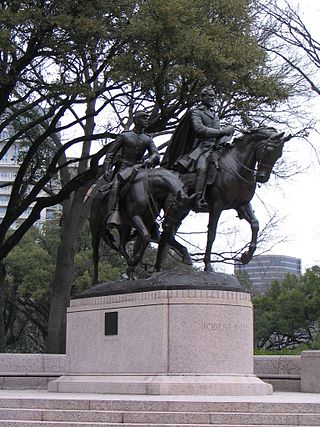Related Research Articles

Person County is a county located in the U.S. state of North Carolina. The population was 39,097 as of the 2020 census. The county seat is Roxboro.

The flags of the Confederate States of America have a history of three successive designs during the American Civil War. The flags were known as the "Stars and Bars", used from 1861 to 1863; the "Stainless Banner", used from 1863 to 1865; and the "Blood-Stained Banner", used in 1865 shortly before the Confederacy's dissolution. A rejected national flag design was also used as a battle flag by the Confederate Army and featured in the "Stainless Banner" and "Blood-Stained Banner" designs. Although this design was never a national flag, it is the most commonly recognized symbol of the Confederacy.

The Battle of Five Forks was fought on April 1, 1865, southwest of Petersburg, Virginia, around the road junction of Five Forks, Dinwiddie County, at the end of the Siege of Petersburg, near the conclusion of the American Civil War.

The flag of Mississippi, also known as the Mississippi flag, consists of a white magnolia blossom surrounded by 21 white stars and the words 'In God We Trust' written below, all put over a blue Canadian pale with two vertical gold borders on a red field. The topmost star is composed of a pattern of five diamonds, an Indigenous symbol; the other 20 stars are white, as Mississippi was the 20th state to join the Union. The flag was adopted on January 11, 2021.

The Battle of Wilson's Creek, also known as the Battle of Oak Hills, was the first major battle of the Trans-Mississippi Theater of the American Civil War. It was fought on August 10, 1861, near Springfield, Missouri. Missouri was officially a neutral state, but its governor, Claiborne Fox Jackson, supported the South and secretly collaborated with Confederate troops.

The Battle of Peachtree Creek was fought in Georgia on July 20, 1864, as part of the Atlanta Campaign in the American Civil War. It was the first major attack by Lt. Gen. John Bell Hood since taking command of the Confederate Army of Tennessee. The attack was against Maj. Gen. William T. Sherman's Union army, which was perched on the doorstep of Atlanta. The main armies in the conflict were the Union Army of the Cumberland, commanded by Maj. Gen. George Henry Thomas and two corps of the Confederate Army of Tennessee.

The Battle of Appomattox Court House, fought in Appomattox County, Virginia, on the morning of April 9, 1865, was one of the last battles of the American Civil War (1861–1865). It was the final engagement of Confederate General in Chief, Robert E. Lee, and his Army of Northern Virginia before they surrendered to the Union Army of the Potomac under the Commanding General of the United States Army, Ulysses S. Grant.

The Appomattox campaign was a series of American Civil War battles fought March 29 – April 9, 1865, in Virginia that concluded with the surrender of Confederate General Robert E. Lee's Army of Northern Virginia to forces of the Union Army under the overall command of Lieutenant General Ulysses S. Grant, marking the effective end of the war.

Völkl Ski International, GmbH, is a sports equipment manufacturing company based in Germany. Initially it manufactured skis, but has extended its line to snowboards, outerwear, and tennis gear. The American branch is located in Lebanon, New Hampshire along with its wholly owned binding manufacturer, Marker. In 2015 Völkl bought the ski boot manufacturer Dalbello.

The 104th Ohio Infantry Regiment, sometimes 104th Ohio Volunteer Infantry was an infantry regiment in the Union army during the American Civil War. It played a conspicuous role at the Battle of Franklin during the 1864 Franklin-Nashville Campaign, where six members later received the Medal of Honor, most for capturing enemy flags.

The 3rd Arkansas Infantry Regiment was a regiment of the Confederate States Army during the American Civil War, and the most celebrated unit from the state. Formed and initially commanded by Colonel Albert Rust, and later falling under the command of Colonel Van. H. Manning, the regiment was part of the Army of Northern Virginia, serving under General Robert E. Lee. The 3rd Arkansas Infantry Regiment served for the duration of the war, from the late months of 1861, through to its surrender at Appomattox Court House in 1865. It was the only regiment from the state of Arkansas to serve the entire war in the Eastern Theater, where most of the major Civil War battles were fought. It was also the only Arkansas regiment to initially sign up for the duration of the Civil War, with all other regiments from the state signing on for a one-year enlistment.
Annin Flagmakers is an American corporation based in Roseland, New Jersey. The flagmaker was founded by Alexander Annin in 1847 and incorporated on January 10, 1910. Annin Flagmakers produces American flags, state flags and national flags of all United Nations members. Annin is a wholesaler that sells through a network of independent dealers and through mass market retailing chains. Annin is a private company owned by the Beard and Dennis families. While sales are not reported, industry estimates are between 75 million and 100 million dollars annually for Annin & Co.

The 3rd Infantry, Arkansas State Troops (1861) was an Arkansas State infantry regiment that served during the American Civil War. The regiment was designated as the 2nd Infantry, Arkansas State Troops, by the State Military Board, but it was named the 3rd Arkansas by Brigadier General Nicholas Bartlett Pearce, Commander, 1st Division, Provisional Army of Arkansas. The regiment is generally referred to as the "3rd Regiment, Arkansas State Troops", or "Gratiot's Regiment" in contemporary accounts. This unit is distinguished from the 3rd Arkansas Infantry Regiment which served in the Eastern Theater of War in the Confederate Army of Northern Virginia. The unit is also distinguished from a later state organization known as Adams' 3rd Arkansas State Troops, which was organized in 1862 and participated in the Battle of Prairie Grove before being disbanded.

The 4th Infantry, Arkansas State Troops (1861) was an Arkansas State infantry regiment that served during the American Civil War. After being raised in mid-1861, the regiment was assigned to the command of Brigadier General Nicholas Bartlett Pearce, who was the commander of the 1st Division, Provisional Army of Arkansas. The regiment is referred to as the "4th Regiment Arkansas Volunteers", or "Walker's Regiment" in contemporary accounts; it was disbanded shortly after the Battle of Wilson's Creek in August 1861. Another Arkansas unit also had the designation 4th Arkansas, the 4th Arkansas Infantry Regiment which formed after the Battle of Wilson's Creek, and spent most of its service in the Confederate Army of Tennessee. There is no connection between the two units.
Valley Forge Flag, based in Wyomissing, Pennsylvania, is one of the largest U.S. flag manufacturers. The company was founded in 1882. It has a large wet printing facility in Olanta, South Carolina.
The Dixie Flag Manufacturing Company, based in San Antonio, Texas, is a prominent U.S. flag manufacturer. The company was founded in 1858.

Although the Confederate States of America dissolved at the end of the American Civil War (1861–1865), its battle flag continues to receive modern display. The modern display began during the 1948 United States presidential election when it was used by the Dixiecrats, a political party that opposed civil rights for African Americans. Further display of the flag was a response to the civil rights movement and the passage of federal civil rights laws in the 1950s and 1960s.
More than 100 monuments and memorials to the Confederate States of America and associated figures have been removed, all but five since 2015. Some have been removed by state and local governments; others have been torn down by protestors.

Robert E. Lee on Traveller is a bronze sculpture by Alexander Phimister Proctor depicting the Confederate general of the same name, his horse Traveller, and a young Confederate States Army officer, formerly installed at Dallas' Turtle Creek Park, in the U.S. state of Texas. The statue was unveiled by President Franklin D. Roosevelt in 1936, removed in 2017, and sold by the city for $1,435,000 to a law firm. It now stands on a Texan golf course.
References
- ↑ Edward McAllister (June 24, 2015). "Major U.S. flag makers to stop making Confederate flags". Reuters.
- ↑ "Company Overview of Eder Flag Manufacturing Company, Inc". Bloomberg Business. Retrieved 25 June 2015.
- ↑ Katie DeLong and CNN Wire Service (23 June 2015). "Eder Flag Manufacturing Company in Oak Creek will no longer manufacture, sell Confederate flag". Fox6Now.com.